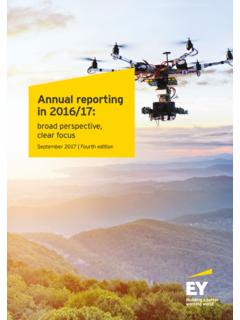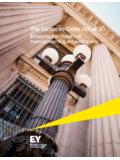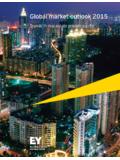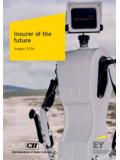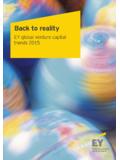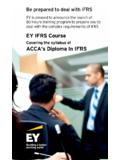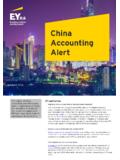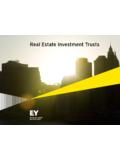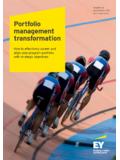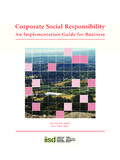Transcription of Sustainable investing: the millennial investor - ey.com
1 Sustainable investing: the millennial investor Why Sustainable investing millennials3 with value-based investment and personal priorities. Initially, Sustainable options will be strongly positioned to investing negatively screened companies matters now attract new assets to the firm as well as and industries, which often led investors Wealth and asset managers have seen retain beneficiary millennial clients. to sacrifice returns for value-aligned a significant influx of client funds flow investment choices. In recent years, into Sustainable investments. In fact, this however, investors have used positive investment strategy has grown Sustainable investing screening of ESG risk factors to create annually since 2012 and currently and its benefits to firms a modern best-in-class investment accounts for 18% of the assets under approach that generates performance that Sustainable investing, also known as management (AUM) in the wealth and asset is in line with and often exceeds market socially responsible investing, is the management benchmarks.
2 This shift toward market process of incorporating environmental, Demand for Sustainable investments is social and governance (ESG) factors outperformance in several Sustainable being driven, in part, by millennials who into investment decisions. Individuals investing products has contributed to the prefer to invest in alignment with personal who invest sustainably choose to increase in demand for these products values. Since millennials are poised to invest in companies, organizations and as fiduciaries look to serve their clients receive more than $30 trillion of inheritable funds with the purpose of generating by not only generating returns, but also wealth, Sustainable investments will measurable social and environmental assessing impact. continue to grow in demand. As a result, impact alongside a financial return. Providing Sustainable investing fund managers are increasingly allocating Impacts are spread across various opportunities enables firms to not only resources to develop products and capture sectors, from renewable energy and capture financial returns for clients, but also this emerging client segment.
3 Climate change, to health, safety and to realize intrinsic returns not replicated According to an EY study,2 when assets community development. elsewhere. These intrinsic returns lead to change generations, firms typically lose Sustainable investing enables individuals deeper connections between the clients and 70% to 80% of those assets. Consequently, to select investments based on values their investing habits, creating long-term the wealth and asset managers who supply customer appetite. Report on US Sustainable , Responsible and Impact Investing Trends, 2014, The Forum for Sustainable and Responsible Investment website, , accessed 1 June 2016. 1. 2. The experience factor: the new growth engine in wealth management, accessed 1 June 2016. According to The millennial Perspective, millennials refers to approximately 80 million US individuals born between the years 1980 and 2000. Millennials are the largest generation in American history, surpassing the baby boomer 3.
4 Generation by 20 million people. Driving market growth The opportunity to maintain strong financial performance coupled with values-based investing is extremely attractive to many types of Sustainable investing has experienced a compound annual growth investors, especially millennials. rate of , increasing AUM from $ in 2012 to $ in 2014, according to The Forum for Sustainable and Responsible As millennials begin to engage with wealth and asset managers, Investment's 2014 report (Figure 1).4 Additionally, the number of they will continue to disrupt the industry due to their sizeable available Sustainable investing funds has nearly tripled since 2008, population, inheritable wealth and preference for digital channels as shown in Figure 2. of communication. Additionally, millennials more consistently select investments that align with their values than previous generations. According to a recent Morgan Stanley survey, 84% of millennials cite Figure 1: The time is now, as Sustainable investments investing with a focus on ESG impact as a central see triple digit growth numbers since 2012.
5 Wealth and asset managers must recognize the demographic 5,000 changes characterizing the quickly changing investment industry. Firms must mobilize quickly to develop the capabilities and products needed to serve the over $4t market and support the coming 4,000. surge of the millennial generation through Sustainable investing. 3,000. The habits of the socially responsible Billions Total net assets (in billions). 2,000 millennial investor As millennials accumulate wealth, firms should shift strategies 1,000 to incorporate the desires of the socially responsible investor . According to Greg Cobb, Director of Fixed Income for Boyd 0. Watterson Asset Management, the industry is moving from a 2004 2006 2008 2010 2012 2014 passive investor population, which is dependent on the income Years from defined benefit and pension plans to a population that is self-funding via their defined contribution plans.
6 These millennials will demand more active involvement in their own investments Figure 2: Growth in Sustainable investing funds as they wish to be more actively involved in controlling their own Year 2004 2006 2008 2010 2012 2014 destiny. Along with this more active approach will come more activist tendencies. 7 Additionally, according to a Morgan Stanley # of 200 231 338 493 720 925 study,8 when compared with non- millennial investors, millennials are Funds incorporating sustainability not only into investment decisions, but overall consumer behavior: This staggering market growth is being driven by not only millennials, but also evolving macro-economic trends. With an millennial investors are nearly twice as likely to invest in estimated addition of 2 billion people by 2050, global demand companies or funds that target specific social or environmental for food, water and energy will drive the need for innovative outcomes.
7 Improvements in infrastructure to address the resource demand 29% of investors in their 20s and 30s seek a financial advisor that associated with a growing population. Clean water and sanitation, provides values-based investing. Millennials rank this priority third innovations in energy generation and distribution, improved in a list of nine identified priorities. health care, and more efficient transportation provide an 17% of millennials indicate they seek to invest in companies abundance of opportunity for Sustainable investment growth. As that use high quality ESG practices, compared with 9% of these investments continue to display a track-record of market non- millennial investors. outperformance, investors of all types will demand that their wealth 15% of millennials indicate they would exit an investment position and asset managers provide products that not only outperform, but due to objectionable firm activity, compared with 7% of non- also align with their values.
8 millennial investors. A recent study by Morgan Stanley,5 which evaluated more than 15% of millennials indicate they would rather purchase products 10,000 funds and managed accounts, shows that Investing in from a Sustainable brand, compared with 7% of non- millennial sustainability has usually met, and often exceeded, the performance investors. of comparable traditional investments. This is on both an absolute and a risk-adjusted basis, across asset classes and over time. This Millennials are achieving greater integration of their money and study illustrates the outperformance of the MSCI KLD 400 (an values by seeking personal fulfillment in their careers, applying a index containing firms that meet a very high ESG standard), which global consciousness to purchases, and investing in Sustainable , achieved an annualized return of since 1990. During this impactful business models. same span, the S&P 500 achieved an annualized return of , a difference of 45 basis points.
9 4. Report on US Sustainable , Responsible and Impact Investing Trends, 2014, The Forum for Sustainable and Responsible Investment website, , accessed 1 June 2016. 5. Study Shines Light On Sustainable Investing, Morgan Stanley website, , accessed 1 June 2016. 6. Sustainable Signals: The Individual investor Perspective, Morgan Stanley website, , accessed 1 June 2016. 7. Greg Cobb, Boyd Watterson, Director of Fixed Income, interviewed by Ernst & Young LLP, 1 June 2016. 8. Sustainable Signals: The Individual investor Perspective, Morgan Stanley website, , accessed 1 June 2016. Millennials identify inequalities throughout the world such as Secondly, employees will look to leadership to influence firm climate risk, world hunger, poverty, and access to health care culture and establish a precedent for a new industry perspective. ultimately creating a heightened sense of global responsibility and Without visible adoption by executive leadership, formally stated driving demand for Sustainable investments.
10 Culture and values lack significance and authenticity. Third, firms must train advisors on how to have targeted and effective conversations with clients around Sustainable investing. Adapting to the changing competitive Training and communication play key roles in strengthening firm landscape culture, especially when compared with other firm initiatives. Finally, firms should seek to hire passionate sustainability Change the culture veterans who have proven they understand how to motivate While Sustainable investing can still be used to create a competitive teams and influence change. Clearly defining the new role will advantage, adopting socially responsible practices is quickly also serve as an additional signal to the organization of its becoming a requirement for doing business in the investment commitment to the development of robust Sustainable investing industry. Embracing this industry trend means changing existing capabilities for advisors.
